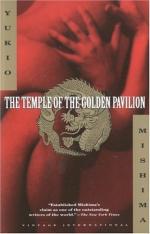|
This section contains 4,658 words (approx. 16 pages at 300 words per page) |

|
SOURCE: Atkinson, David W. “Alienation in the Novels of Yukio Mishima.” The International Fiction Review 16, no. 1 (winter 1989): 56-64.
In the following essay, Atkinson contends that the pursuit of freedom and beauty lead to alienation in Mishima's novels.
Few novelists dominate twentieth-century Japanese fiction as does Yukio Mishima. Born on January 14, 1925 to an upper middle-class family in Tokyo, Yukio Mishima distinguished himself early as a brilliant student, graduating from Gakushuin or Peers' School in 1944. While still in school, Mishima published his first significant work Hanazakari no Mori (1941; The Forest in Full Flower), which expresses many of the ideas and influences that had a continuing impact on Mishima's writing throughout his life. While Mishima produced over twenty-five pieces of major fiction, as well as short stories, plays, and critical works, it was not his writing that initially drew him to the world's attention. Frustrated by the lack of spiritual values...
|
This section contains 4,658 words (approx. 16 pages at 300 words per page) |

|


